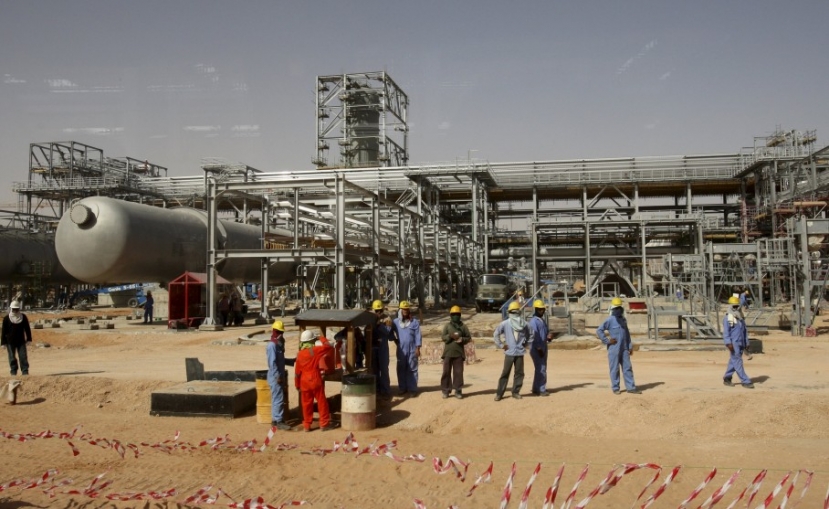Saudi Arabia has a giant mess on its hands
08.02.2016 17:33
 Saudi Arabia has a giant mess on its hands
Saudi Arabia has a giant mess on its hands
The next casualty in Saudi Arabia's oil price war might be its own economy.
That's because, with oil revenues drying up, Saudi Arabia is about to make the same mistake that Europe has over and over and over again. What's that? Well, trying to cut its budget without cutting interest rates or otherwise softening the economic blow.
Now, it's true that Saudi Arabia has to do something. You can't have an economy based on redistributing oil money when there isn't that much oil money to redistribute. Especially when it doesn't look like that's going to change anytime soon. Saudi Arabia, you see, has been flooding the market with cheap crude to try to drive its high-cost competitors out of business, but that isn't as easy as it used to be. Shale drillers can stay profitable at lower prices than before, and, more importantly, can turn production on or off as needed for relatively little. So even if the Saudis succeed in forcing them into hibernation, they should still be able to wake up in time to keep prices from rising to much more than $50-a-barrel. And that, in turn, means that Riyadh can't continue to spend so much money that it'd need oil to be at $80-a-barrel to pay for it.
The question, though, is how it's going to cut back. The easiest way to do so, of course, is not to. Saudi Arabia could just hope that shale producers aren't quite as resilient as they seem, and that prices will soon snap back up — in which case, Riyadh could keep spending like it has been by borrowing what it needs or dipping into its war chest of reserves. Indeed, that's basically what it has been doing for the past year. The only problem is that its deficit has swollen to such size — some 15 percent of gross domestic product — that it can't keep this up if it thinks there's any chance it's wrong about oil prices. And it's starting to. So now it's on to Plan B: austerity. Riyadh announced that it's going to reduce fuel subsidies, raise electricity taxes, and bump up water costs to try to close its deficit by 4 percent of GDP next year.
It won't work.
Saudi Arabia has what Paul Krugman calls the St. Augustine problem. It needs fiscal chastity and continence, but not yet — at least not without a cheaper currency. In other words, Riyadh really can't afford to keep spending13 percent of the country's GDP on energy subsidies, but it also can't afford to hurt the economy any more than low oil prices already have. The simple story is that less government spending means less spending in the economy overall unless you do something to offset the cuts.
How much less? Well, as Europe has shown, every $1 of austerity makes the economy shrink something like $1.50 when you don't make up for the spending cuts with interest rate cuts or a weaker currency — which Saudi Arabia can't right now. It has pegged its currency, the riyal, to the dollar, so it has to increase interest rates when the Federal Reserve does. The result is that Saudi Arabia's currency has gone up against almost every other one at the same time that Saudi Arabia's economy needs it to go down. You can get an idea how overvalued the riyal has become by comparing it to another resource-rich country's currency — the ruble. Since the start of 2014, Saudi Arabia's currency is, adjusted for inflation, up 15 percent against a basket of others, while Russia's currency is down 25 percent. Now, Western sanctions have something to do with the second part of that, but the fact remains that Saudi Arabia is making its currency far too expensive by tying it to the dollar.
That means Saudi Arabia's 4 percent of GDP of tax hikes and spending cuts should add up to a 6 percent of GDP contraction and, as a result, 3 percentage points higher unemployment. Not exactly good for social stability when you're already taking away some of the subsidies you've been buying people's loyalty — or at least acquiescence — with.
There is no free lunch here, but there is a better way. That's devaluing its currency. The important thing to remember, as economist Lars Christensenpoints out, is that even though Saudi Arabia gets paid for oil in dollars, it pays its people in riyal. So there are two ways for it to earn more of its own money: for the price of oil to go up against the riyal and everything else, or for the price of the riyal to go down against oil and everything else. The first one isn't happening, so the second one is all that's left. That would give Riyadh the riyals it needs to keep paying the same amount of benefits — no spending cuts necessary — albeit in riyals that aren't worth as much as before. In other words, inflation would do the job that austerity is now. That might not sound like much, if any, of an improvement, but here's why it is: The deficit would disappear and the economy would keep growing. And with half its population under 25 years old, Saudi Arabia needs that so it can give people jobs if it can't give them as much welfare. That's the reason other oil-dependent countries, like Azerbaijan and Kazakhstan, have already given up their dollar pegs, and why markets are beginning to bet that Saudi Arabia will be next.
You can only defy economic gravity for so long.
